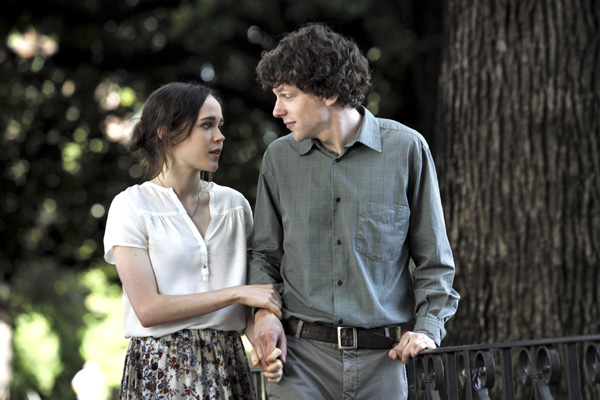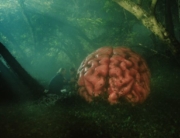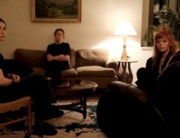
Ellen Page and Jesse Eisenberg (Philippe Antonello/Sony Pictures Classics)
The Spanish Steps, the Forum, Piazza Navona—all of the must-sees of a Roman holiday are checked off on the latest stop in Woody Allen’s European hotspots tour. The familiar postcard locations make sense since the Eternal City is experienced mainly through newcomers. There’s not a graffiti strewn subway car or post-war, cookie-cutter apartment complex in sight. (And if the landmarks aren’t familiar enough, the opening and closing Italian 1950s pop classic, “Volare,” will be.) With summer airfare through the roof, this affable comedy of thwarted desires may be the most economical way to take in the Old World and have a vicarious life-changing romantic fling in the process.
Allen juggles four storylines, two stretched almost too thin, and one in particular not stretched out enough. The comedy wanly begins with a too-brief-to-be-necessary introduction by a traffic cop telling the audience that in Rome “All is a story” (and none here terribly original). Sure enough, a blond and button-nosed Yank, Hayley (an underused Alison Pill), asks for directions to the Trevi Fountain from a good-looking young Italian man. Months later, she’s engaged to him, Michelangelo (Flavio Parenti), and her parents (Woody Allen and Judy Davis) fly out to meet the prospective in-laws.
John (Alec Baldwin), an American shopping mall designer, returns to the old stomping grounds of his student days, and begins tutoring and popping up as the voice of reason for expat architectural student, Jack (Jesse Eisenberg), warning him of the wiles of Monica, a first-timer to Rome staying with Jack and girlfriend, Sally. Or, is John reliving his past vicariously through Jack, this time with the advantage of hindsight? An L.A. actress, the Camus-quoting Monica loves to talk about herself. She’s takes her epiphanies solemnly seriously, and loves to relive and relish details of her sexual exploits that she regales for her hosts. It’s understandable why Jack would be drawn to her, though not why Sally wouldn’t notice.
A lower-strung-than-usual Roberto Benigni plays a role tailor-made for his broad band of comedy: a married office drone who suddenly and miraculously morphs from schmuck to overnight media star, famous mostly for being famous. He’s befuddled at first by the adoration, but then quickly embraces the perks of fame—jumping in the sack with the most stunning models in the city world.
Lastly, reserved small-town newlyweds Antonio and Milly (Alessandro Tiberi and Alessandra Mastronardi) arrive in the big city for their honeymoon and to meet his rich, well-placed relatives. For Antonio, a complication walks into his hotel room in the form of Penélope Cruz as a high-priced call girl stuffed in a size-two, whore-red miniskirt. She barges in mistakenly thinking he’s her prepaid client. Meanwhile, Millie has gone out to get her hair done and gotten lost in the labyrinth of the city streets. The farcical machinery, here and elsewhere, feel forced and a little too easy. Just as Antonio figures out why this stranger’s throwing herself on top of him, the door opens. Enter the disapproving family.
However, the pace keeps up with the film’s itinerary, jumping from embarrassment to proposition and more. Cruz has so much fun in her nothing role that she ignites her scenes, and the tempo increases. (When will Allen write a leading role for her?) He has, as usual, the best one-liners.
Allen plays Jerry, a former opera director, who overhears Michelangelo’s father, Giancarlo (tenor Fabio Armiliato), singing a soaring aria from Pagliacci in the shower—a discovery that could jump-start his retired career. (In a jab at the modern tradition of Regietheater, Jerry once directed Rigoletto with all the singers as white mice.) Giancarlo, the erstwhile mortician, sings beautifully all alone, lost in his thoughts, but at an audition, he chokes. He needs the security of the shower. In some ways, this script is like Giancarlo singing his heart out, joy riding on automatic pilot. All of the characters are painted in broad strokes, or barely at all, and the film spends more time on the situational set-ups and not the fallouts. Allen tosses his various themes in the air, and some land more gracefully than others. Though you’ll foresee how the paths each of the honeymooners will take, at least their storyline has a solid ending.
It feels like Allen, the writer, just wanted to wrap the other threads up (even more so than in Whatever Works). The lessons learned by Benigni’s Leopoldo are facile as he discovers the price of losing his anonymity. It’s social satire light, perhaps a poke in the ribs to Berlusconi’s media-obsessed Italy. (Leopoldo’s mousey wife neither has any idea nor cares that her husband sleeps with every velina in sight.) The one actor who has a virtual walk-on role is Greta Gerwig, who is otherwise having a stellar year in the movies. Her gangly and dull Sally is so underwritten that she functions merely as a go-between for her boyfriend and close friend Monica. Allen keeps the tone buoyant, pushing the specter of betrayal and its ramifications far off screen. By the movie’s end, Gerwig, and for that matter Eisenberg, have practically disappeared.
The couple is rightfully overshadowed by Monica’s grandstanding. She demands attention and knows how to command a room, and in this role, Ellen Page takes narcissism to new heights. Coldly manipulative, Monica is not quite an all-out villain, but she’s close. And as far as I can recall, she’s the first character in Allen’s universe to shatter decorum and drop an F-bomb since Allen himself did so in Deconstructing Harry. Yet she fits right into Allen’s repertory of over-intellectualized characters, who have no idea what they really want, or reject it once they get it.






Leave A Comment